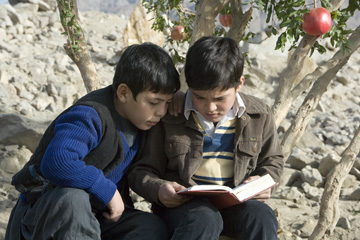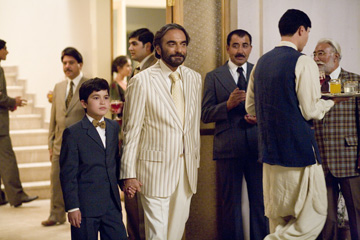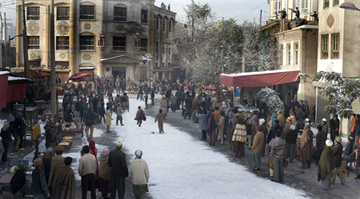Khaled Hosseini’s moving novel is a story of friendship betrayed and redeemed. It’s a dense four hundred and seventy-six page piece that gave North Americans one of their first looks at the day to day lives of the non-fundamentalist Muslims of Afghanistan – then showed them that the Taliban’s worst victims are their own people. Marc Forster’s film adaptation captures much of the book’s feel – especially in the friendship between Amir, the son of a prosperous businessman, and Hassan, son of the family’s long-time servant.
We meet Amir [Zekiria Ebrahimi] and Hassan [Ahmad Khan Mahmoodzada] as children in pre-communist Afghanistan. Despite being of different ethnic and social status, they are the closet of friends. They go to movies together, fly kites [and run them down] in contests that approximate battle [the kite flyers try to cut down their opponents’ kites and retrieve the fallen kites as trophies] and Amir reads stories to Hassan.
Amir’s Baba, or father [Homayoun Ershadi], is disappointed in his son who, he says, will never stand up for himself – but he seems to love Hassan like the son he wishes Amir was. Thus, when Amir wins a kite flying competition in which the kite flyers attempt to cut down their opponents’ kites and Hassan runs down the last kite Amir cuts, he doesn’t come to Hassan’s aide when he is cornered by a trio of bullies.
Not long after that, Amir frames Hassan for theft and the boy and his father leave Baba’s service. Shortly after that, Baba and Amir emigrate to the U.S. and Amir becomes a writer – but he never forgets the shame of leaving Hassan to his fate.
In America, the prosperous Baba becomes just another struggling immigrant – managing a convenience store and selling small treasures at a flea market. Amir becomes taken by Soraya [Atossa Leoni] and marries. After his father dies of cancer, Amir gets a call from a family friend who is now in Pakistan. Rahim Khan [Shaun Toub] – Amir’s first adult friend, and first to believe in his storytelling skills – who tells him “there is a way to be good again.”
Being good involves returning to Afghanistan to retrieve Hassan’s son – not an easy thin now that the Taliban have driven the Russians out of the country and rule with a heavy, very fanatical hand.
In one respect, The Kite runner is like The Golden Compass: it could have used ten or fifteen more minutes that showed the lives of its young characters in Afghanistan, and done a little more character development. Even so, we learn enough about Hassan, Amir and Baba that the film’s various situations feel real and have a certain emotional impact.
David Benioff’s script may be a bit too condensed, but Marc Forster’s direction gives it the heft it needs for us to buy the horrifying coincidence which brings the adult Amir into the presence of the bully who hurt Hassan. It’s this coincidence that allows Amir to finally do what his father never believed he would do – stand up for himself – and someone else.
Forster’s camera gives us the feel of being in the bustling Kabul when the two pals head to the cinema or run through the bazaar. Then he gives us panoramic shots of the ruined Afghan countryside following the country’s occupation by the Soviets and the Taliban. In a telling sequence, Amir visits his family home before beginning the search for Hassan’s son, and the contrast between what the house is and was is heartbreaking.
Like the novel, The Kite Runner gives us a look at the lives of Afghans before the country came under the control of two successive oppressors – and shows us that Afghanistan’s people were much like us in many ways that count: their friendships, their families and their belief in their country and religion. Then, it shows us that every religion has its hardcore fundamentalists [a scene at a local soccer pitch will chill you], and that not every Muslim is evil [something that even now, post-9/11 North Americans seem to have a problem accepting]. All of this is layered in behind Amir’s betrayal and redemption and his finally becoming the man his father hoped he would become.
Much of the film is in Dari, so there are a lot of subtitles – but don’t let stop you from checking out this solid, humane film. Despite its not having any recognizable stars, The Kite Runner’s story will stay with you long after you’ve left the theatre.
Final Grade: B+



